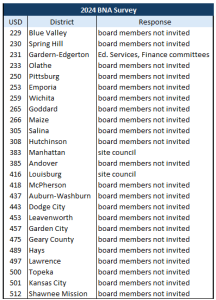For the fourth straight year, superintendents across Kansas demonstrate why student achievement won’t improve until adult behaviors change.
State law says the local school board “shall conduct” a building needs assessment in each attendance center annually to identify barriers to reading and math proficiency and the budgetary changes necessary to overcome them. When Kansas Policy Institute first discovered districts were not following the law in 2021, it was clear from their responses to our inquiries that some weren’t aware the law existed. That’s not just on school districts, but an indictment of the Department of Education and the Kansas Association of School Boards.
The House and Senate Education Committees have been crystal clear – school board members are to be active participants in school-level meetings with principals and teachers. Still, some superintendents and KASB contend that the law only requires board members to review staff-prepared reports. But regardless of how a court may interpret “shall conduct,” why would superintendents not want board members to hear directly from teachers?
Elected school board members are responsible for improving student outcomes. They are responsible for setting goals, ensuring that the district has an effective plan to meet the goals, and monitoring implementation and progress.
Some school board members are equally complicit in failing to identify proficiency barriers. A board majority can force the issue by establishing a policy that mandates board participation in meetings with teachers and principals. Still, the majority in many Kansas districts choose not to force the issue. There are as many students below grade level as are proficient, and the most recent ACT results show only 19% of Kansas graduates are college-ready in English, Reading, Math, and Science, so why would board members not force the issue and take an active role?
It’s unlikely that board members find student achievement acceptable, so the only remaining logical answer is that some board members prioritize currying favor with the staff over improving student outcomes. That is similar to why many Republican and Democratic legislators won’t vote to hold schools accountable; they know the administrative bureaucracy will work to get them voted out of office, and getting re-elected is more important than getting students educated.
Needs assessments survey results
Responses to this year’s survey of 25 school districts fall into two broad categories – (1) districts that openly admit board members were not invited to participate in needs assessments with teachers and principals, and (2) districts that claim board members were allowed to participate but have no documentation to support the claim.

Gardner-Edgerton, Manhattan, and Louisburg say board members participate in site council meetings to discuss needs assessments.
Gardner-Edgerton Superintendent Brian Huff says the needs assessments were discussed at meetings of the Education Services and Finance Committees. Huff says the minutes of the meetings are not sufficiently “granular” to reflect what was discussed but referred us to Item 5 of the Finance Committee meeting on May 29, attended by board member Greg Chapman. The meeting was scheduled for one hour and included a property/casualty presentation, review of the April financial statements, approval of a dozen contracts and purchase proposals, updates on four other items, and six topics under Item 5: FY 2025 Budget Planning Update. One of those six topics is “Building Needs Assessments – completed April 2024, statutorily required for budget planning.”
The needs assessments were on the agenda, but the agenda allotted no time to discuss reports listed as ‘completed.’
USD 383 Manhattan provided copies of site council reports for each school, but the three statutorily required questions are missing: identify proficiency barriers, budgetary changes needed to overcome them, and how long it will take for students to be proficient.
Louisburg Superintendent Brian Biermann shared site council reports similar to those from Gardner-Edgerton; review of needs assessments is on agendas but lacking evidence of substantive efforts to improve proficiency.
The Louisburg Broadmoor Elementary agenda listed ideas, including crosswalks and accessibility markings in the parking lot, more information about family events, an orchestra offering, and playground accessibility. Only professional development and the student-teacher ratio might have an indirect impact on achievement.
The Louisburg High School agenda had a section for needs assessments, but time was also devoted to student-led conferences, what seniors are excited about, graduation, and the Career Fair. The Needs Assessment section lists ideas shared, including vape education, a working computer in the wellness room, and absenteeism. A few academic items are listed, but nothing about budgetary changes or the time needed to achieve reading and math proficiency.
Staff is not to blame for these woeful deficiencies; those are solely management issues for superintendents and board members.
Pretending to conduct needs assessments and not allowing board members to participate in school-level meetings demonstrates why student outcomes cannot change until adult behaviors change.





